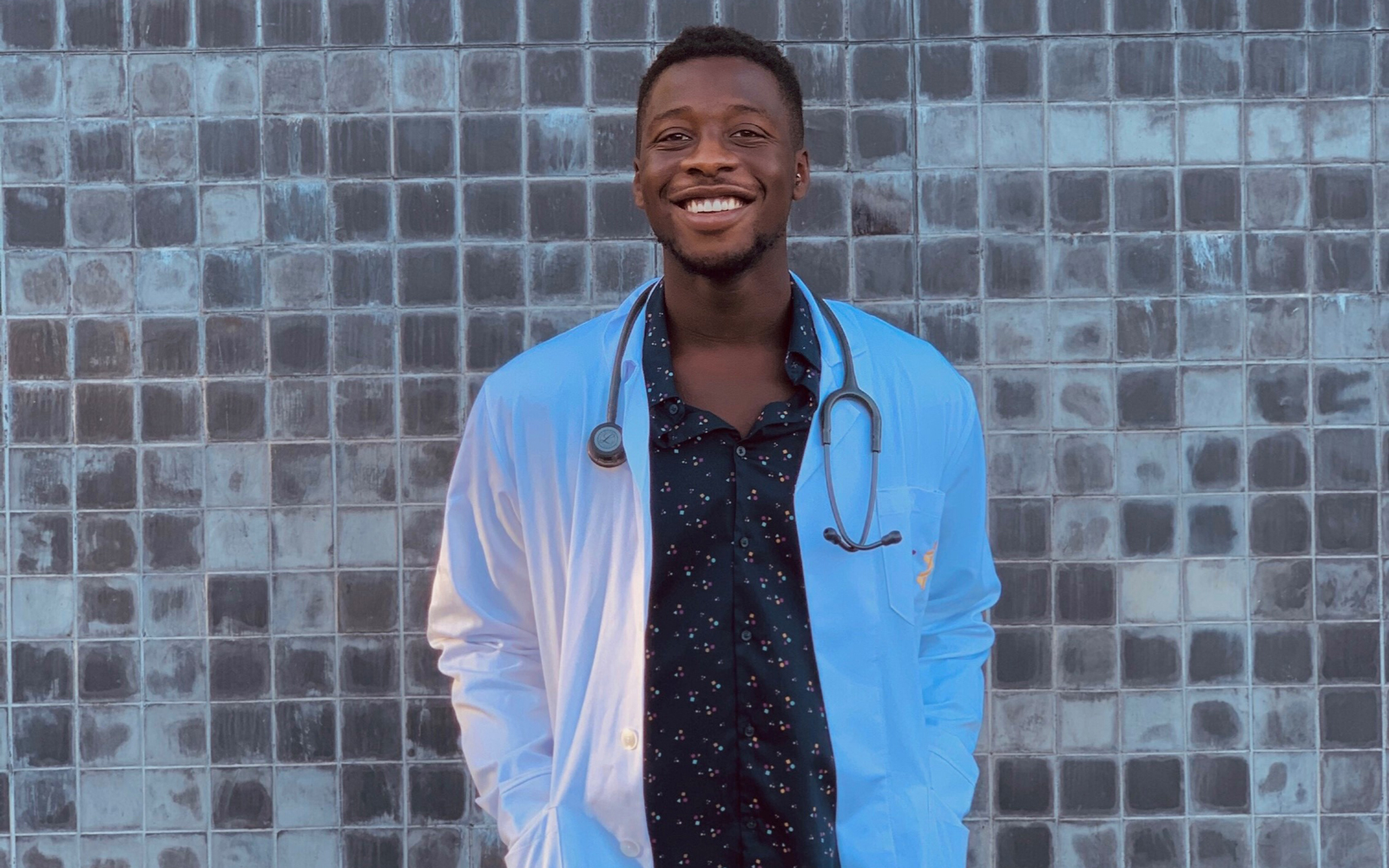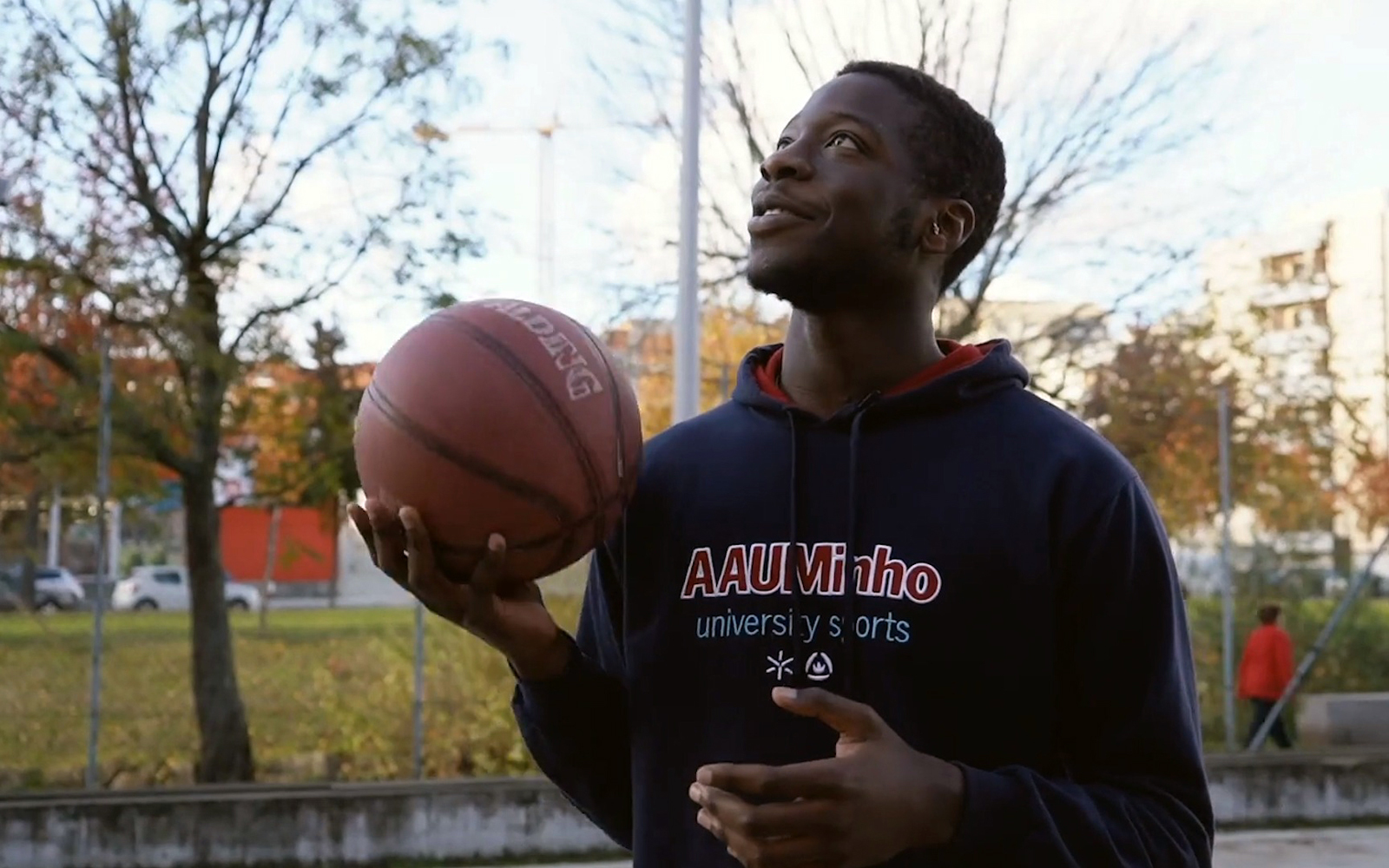“The main thing is to enjoy what we do”

Born in Braga, Josimar Pacheco Cassamá is in the fourth year of Med School at Universidade do Minho and juggles his vocation, medicine – which he says came from his desire, since he was a child, to “do something for others” – with his love for basketball and his career as an athlete at Sporting Clube de Braga.
An example of organisation and resilience, Josimar dedicates himself to many projects with heart and soul, but also pragmatism, with a thirst for knowledge and learning more that he also identifies in his colleagues from the Gulbenkian Grantees Network.
You are in the fourth year of medical school. Why did you choose this path?
I have always loved the fields of health and science and since I was a child, I knew I wanted to do something for others. I always liked to help, to give the best of me to someone else, so when it was time to apply, I felt it was the course for me.
And are you enjoying the experience?
I am loving it. I am really happy to have made this choice. It is a bit annoying in the beginning because you think “when am I going to apply this?”, “when are we really going to become doctors?”, “when are we going to help people? Only after the third and fourth year, when we start talking with patients at the hospital, do we realize it all pays off. Mostly because we are helping others and doing as much as we can. I feel that it becomes more and more rewarding with time.
Apart from med school, which is already very demanding, you also play basketball. What came first, basketball or medicine?
To be honest, I really do not know. Since I started playing basketball at a very young age, I could say that basketball came first. I knew I liked medicine, but it was more of a children’s idea, ‘I want to be a doctor when I grow up’ kind of thing – only later did I begin to see it as a future.
How do you juggle between the two?
Above all, before mentioning organisation and method, I think it is essential to enjoy both. Whether we are talking about basketball and medicine or two other completely different things. The main thing that makes us want to dedicate ourselves and make efforts, even if it means not being around friends as much or not resting as much as we should, is to enjoy what we do.
I think it all starts here. Then, it requires method, organisation and often giving up certain things, but what you accomplish is so good that it all makes up for what you leave behind.
What do you get out of playing basketball?
Basketball helps me organise. Thinking that I have a game in the weekend, in Coimbra or Porto, helps me to have very clear study goals.
It also helps me with the social aspect of life because during some periods of the year I have to study a lot and sometimes it is difficult to talk to people or leave the house. Knowing that I have a training session at the end of the day, apart from being something I really enjoy, is sort of a relief, a relaxing moment. It helps me to concentrate and get some motivation to study later and vice versa. It is that moment of the day when I simply enjoy what I am doing.

Do you think it will be possible to keep on doing both things in the future or will you eventually have to choose?
I have given it some thought, especially when I think about the sixth year, which requires a lot of study because of the national exam. I try not to think too much about what I will or will not be able to do in the future, I try to focus on what I can do now.
There are certain times when I might not be able to go to a training session because I must study. Other times I have a game and I cannot study as much. If this is doable for now, fine. Later, if I have to choose, I will choose; until then there is no point in thinking about it. But it is definitely a question that is always hanging in my mind.
In the meantime, you are also involved in a sustainability project.
I felt that I lacked a little connection to the faculty, because the Faculty of Medicine in Braga is in a different location, so we do not have much contact with other students. I have always been very interested in sustainability; it is a field that fascinates me.
So, together with a friend from Law School and a friend from Textile Engineering, we decided to create this project, which is called “Society Loving The Planet Minho”. It is not activism nor a very dramatic standpoint, but simply a set of tips about things we can all do.
We noticed that this was something that was missing – something more connected with the idea of sustainability. The issue of brands, of “green marketing”, of a person wanting to buy a given product because it is not as bad for the environment, of not wanting to use plastic bags, or wanting to reuse to spend less money… Basically, we wanted to introduce this concept through tips and suggestions for individual practices for university students.
Has it been going well?
The project was set up during the quarantine in March last year, and we have not had the opportunity to do anything offline yet, so a lot of the feedback we get is through social media, but it is going well.
Recently we did an online debate about how pollution has affected our five senses, and we have had some really positive feedback. I think it is a project that really has room to grow. Our goal is to reach more students and develop more and more sustainability actions. The idea is to involve municipal councils, local businesses… I think it will definitely grow in scale.
What would you say was the impact of the Gulbenkian scholarship for you?
I would be hypocritical if I did not mention the monetary aspect. It helped me to buy material and get online subscriptions for medical platforms; many of the books are expensive, many online platforms are paid for. It also helps me with travelling, because depending on the speciality I may have to go to the hospitals in Braga, Viana do Castelo or Guimarães.
It also allowed me to be in touch with a network of people, people who are curious like me. I feel that all the people I came into contact with at Gulbenkian have the same spirit of curiosity, of dissatisfaction with the knowledge they have, in the sense that they always want to know more, read more, study more, talk more. It allowed me to have contact with other realities, other people. The Mindfulness workshop was also very enriching. It helped us not only to evolve as students, but above all as persons.
Where do you see yourself in 10 years?
Well, ideally, in 10 years’ time I see myself working in a speciality that interests me. I have always liked gastroenterology, neurology, psychiatry… These are fields that involve contact, consultation, more than others such as surgery, pathological anatomy or public health.
I would also like to be involved in areas like teaching or research in the future. I have several interests and I enjoy doing different things, so I feel that only being a doctor might be limiting for me. I would like to help people, get involved in something social, even if it is a local non-profit organisation, something connected to the town hall.
When I think about it, what I most enjoy in life has to do with giving and receiving. And I have already received so much that, if I have the chance, I want to give to others. If I can work in association with Gulbenkian, it would be great, even if it is just to give a testimony of my experience. If I can play basketball – at 32 I will already be a bit old, but if I can still play – perfect. And with a family later on, who knows (laughs).
